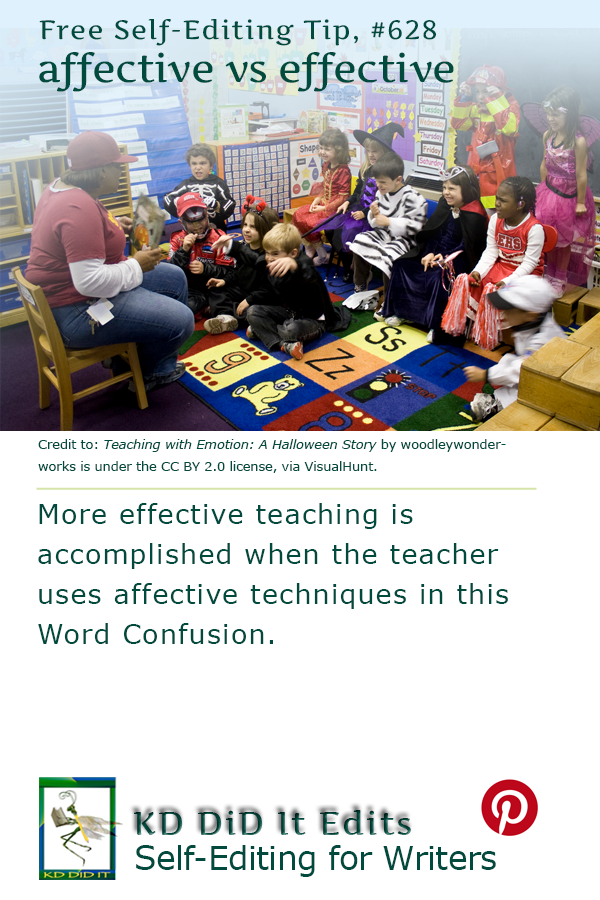Feelings, nothing more than feelings . . . [by Morris Albert, <https://genius.com/Morris-albert-feelings-lyrics>] are what affective is all about. If you’re feelin’ it, you’re being affected by it.
Now, I love feeling as much as the next person, and I adore being effective. A word that essentially means accomplishing.
So let’s go out there and be affective in being effective!
You may also want to explore the post on “Affect versus Effect“.
Word Confusions . . .
. . . started as my way of dealing with a professional frustration with properly spelled words that were out of context in manuscripts I was editing as well as books I was reviewing. It evolved into a sharing of information with y’all. I’m hoping you’ll share with us words that have been a bête noire for you from either end.
If you found this post on “Affective versus Effective” interesting, consider subscribing to KD Did It, if you’d like to track this post for future updates.
| Affective | Effective |
|---|---|
 |
— |
| Part of Grammar: | |
| Adjective | Adjective; Noun
Plural for noun: effectives |
| [Psychology] Relating to moods, feelings, and attitudes
Of, caused by, or expressing emotion or feeling
Causing emotion or feeling [Medicine] Concerned with or arousing feelings or emotions |
Adjective: Successful in producing a desired or intended result
[Attrib.] Fulfilling a specified function in fact, though not formally acknowledged as such
Adequate to accomplish a purpose; producing the intended or expected result Prepared and available for service, especially military service Noun: The effective total of a military force |
| Examples: | |
| Affective disorders are a set of psychiatric diseases, also called mood disorders, the main types of which are depression, bipolar disorder, and anxiety disorder.
“Instead, it turned out to be richly perceptual and affective” (Gopnik). “The repetitive nature of his work is both effective and affective, especially in an exhibition of this scale” (Cavanagh). “These feelings are the affective basis of the idea of nationalism” (Partridge). |
Adjective: There are a number of effective solutions to environmental problems. The agreements will be effective from November. The region did not come under effective Dutch control until 1904. The law becomes effective at midnight. The corporation has an effective price of $176 million. Wow. That was an effective finale. We need more effective teaching methods. How can we ever take effective steps toward peace when they’re involved? We have an effective fighting force. Noun: |
| Derivatives: | |
| Adjective: affectless, nonaffective Adverb: affectively Noun: affect, affectivity, affectlessness Verb, transitive: affect |
Adverb: effectively Noun: effectivity, effectiveness Verb, transitive: effect |
| History of the Word: | |
| Late Middle English via the French from the late Latin affectivus, which is from afficere meaning work on, influence, from ad- (at, to) + facere (do).
The original sense was like, love, hence (like to) use, assume, etc. |
Late Middle English from the Latin effectivus, which is from efficere meaning accomplish, which is from ex- (out, thoroughly) + facere (do, make). |
C’mon, get it out of your system, bitch, whine, moan . . . which words are your pet peeves? Also, please note that I try to be as accurate as I can, but mistakes happen or I miss something. Email me if you find errors, so I can fix them . . .and we’ll all benefit!
Satisfy your curiosity about other Word Confusions on its homepage or more generally explore the index of self-editing posts. You may also want to more generally explore the index of self-editing posts. You may also want to explore Formatting Tips, Grammar Explanations, Linguistics, Publishing Tips, the Properly Punctuated, Writing Ideas and Resources, and Working Your Website.
Resources for Affective versus Effective
Apple Dictionary.com
Cavanagh, Alice “Keith Haring’s Public, Political Art at Paris’s Musée D’Art Moderne.” The Daily Beast. 19 April 2013.
Dictionary.com: affective, effectives
Gopnik, Blake. “A Silence Worth 1,000 Pictures.” Daily Beast. 20 Sept 2013. Web. n.d..
Partridge, G.E. The Psychology of Nations: A Contribution to the Philosophy of History. Macillan Company: 1919.
Pinterest Photo Credits:
Teaching with Emotion: A Halloween Story, <https://visualhunt.com/f2/photo/2970929574/516020cabf/>, by woodleywonderworks, <https://visualhunt.com/author/578ea9>, is under the CC BY 2.0 license, via VisualHunt.
Revised as of 2 Apr 2024
By: Kathy Davie

